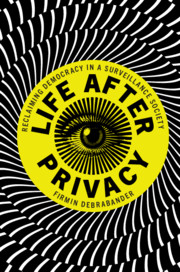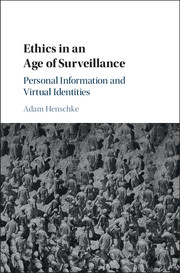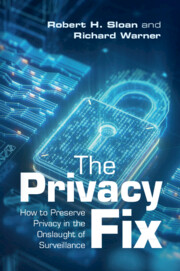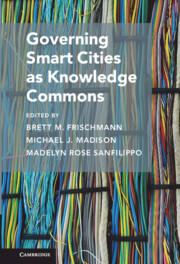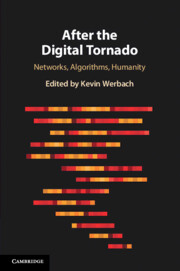Life after Privacy
Reclaiming Democracy in a Surveillance Society
$27.95 (T)
- Author: Firmin DeBrabander, Maryland Institute College of Art
- Date Published: September 2020
- availability: In stock
- format: Paperback
- isbn: 9781108811910
$
27.95
(T)
Paperback
Other available formats:
Hardback, eBook
Looking for an examination copy?
This title is not currently available for examination. However, if you are interested in the title for your course we can consider offering an examination copy. To register your interest please contact [email protected] providing details of the course you are teaching.
-
Privacy is gravely endangered in the digital age, and we, the digital citizens, are its principal threat, willingly surrendering it to avail ourselves of new technology, and granting the government and corporations immense power over us. In this highly original work, Firmin DeBrabander begins with this premise and asks how we can ensure and protect our freedom in the absence of privacy. Can—and should—we rally anew to support this institution? Is privacy so important to political liberty after all? DeBrabander makes the case that privacy is a poor foundation for democracy, that it is a relatively new value that has been rarely enjoyed throughout history—but constantly persecuted—and politically and philosophically suspect. The vitality of the public realm, he argues, is far more significant to the health of our democracy, but is equally endangered—and often overlooked—in the digital age.
Read more- Provides an interdisciplinary analysis, drawing upon academic fields including philosophy, politics, media studies, law, and history
- Examines the peculiarities of online behavior and explains how our interaction with digital media facilitates the surrender of privacy
- Questions both the historical and philosophical identity of privacy
Reviews & endorsements
'… Life After Privacy: Reclaiming Democracy in a Surveillance Society is an eloquent, compelling call for us to rethink our commitment to privacy by understanding its history and uses. Rather than attempting to double down on a possibly doomed principle, DeBrabander argues that what is really needed is more democracy, and specifically a newly energized commitment to a public sphere that requires open, transparent, and meaningful debate. An indispensable book for our times that does what great political philosophy needs to do - make us question what we mean by our most basic concepts.' William Egginton, author of The Splintering of the American Mind
See more reviews'In 2020, more so than in 1984, the Big Brother is watching you. But does this really matter? - asks Firmin DeBrabander’s pungent new book. Ranging from intellectual history to contemporary economics, from Big Data to Big Politics, from confession to contestation, Life After Privacy argues that we should finally begin caring for the public realm, rather than obsessing about intrusions into the private domain, which is something of a political fiction. If there is a work with the potential to reframe the very terms of the current debate on privacy, it is the one you are now holding in your hands!' Michael Marder, author of Political Categories: Thinking Beyond Concepts
'This book makes accessible a counter-intuitive (perhaps even seemingly-contrarian) argument about privacy that deserves a hearing. Not all readers will agree with DeBrabander's conclusion that privacy is pretty much dead. But this is a view murmured often enough in Silicon Valley to warrant serious attention. DeBrabander understands our skepticisms but skillfully argues that we are inexorably drawn to this conclusion nonetheless. Those who care deeply about privacy, as well as those who look forward to the transparent society, will learn much from this book's subtle arguments. And remember: the best philosophy books are the ones that strike you as implausible by their title but leave you convinced after you've read them.' Colin Koopman, author of How We Became Our Data
'Life After Privacy does a good job of setting our angst in a historical or philosophical setting.' Richard Waters, Financial Times
'This is public philosophy at its best.' Paul Showler, LSE Review of Books
‘… if you are interested in contemporary debates over surveillance or data, this book will serve you well. Indeed, it is likely to generate some much-needed soul-searching, or perhaps even the deletion of an app or two. It will also be a valuable read for anyone keen to think through the relationship between democracy and the public sphere …’ Everet Smith , Ethics and Information Technology
Customer reviews
Not yet reviewed
Be the first to review
Review was not posted due to profanity
×Product details
- Date Published: September 2020
- format: Paperback
- isbn: 9781108811910
- length: 180 pages
- dimensions: 227 x 152 x 10 mm
- weight: 0.28kg
- availability: In stock
Table of Contents
Preface
1. Confessional Culture
2. Defenses of Privacy
3. Big Plans for Big Data
4. The Surveillance Economy
5. Privacy Past and Present
6. The Borderless, Vanishing Self
7. Autonomy and Political Freedom
8. Powerful Publics
Conclusion.
Sorry, this resource is locked
Please register or sign in to request access. If you are having problems accessing these resources please email [email protected]
Register Sign in» Proceed
You are now leaving the Cambridge University Press website. Your eBook purchase and download will be completed by our partner www.ebooks.com. Please see the permission section of the www.ebooks.com catalogue page for details of the print & copy limits on our eBooks.
Continue ×Are you sure you want to delete your account?
This cannot be undone.
Thank you for your feedback which will help us improve our service.
If you requested a response, we will make sure to get back to you shortly.
×
